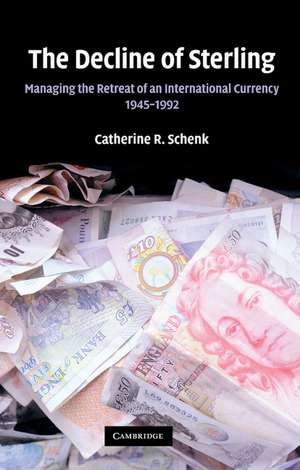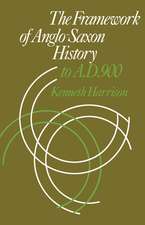The Decline of Sterling: Managing the Retreat of an International Currency, 1945–1992
Autor Catherine R. Schenken Limba Engleză Paperback – 17 iul 2013
| Toate formatele și edițiile | Preț | Express |
|---|---|---|
| Paperback (1) | 333.65 lei 22-36 zile | |
| Cambridge University Press – 17 iul 2013 | 333.65 lei 22-36 zile | |
| Hardback (1) | 872.03 lei 43-57 zile | |
| Cambridge University Press – 26 mai 2010 | 872.03 lei 43-57 zile |
Preț: 333.65 lei
Nou
Puncte Express: 500
Preț estimativ în valută:
63.84€ • 66.83$ • 53.14£
63.84€ • 66.83$ • 53.14£
Carte disponibilă
Livrare economică 10-24 martie
Preluare comenzi: 021 569.72.76
Specificații
ISBN-13: 9781107612990
ISBN-10: 1107612993
Pagini: 464
Ilustrații: Illustrations
Dimensiuni: 152 x 229 x 23 mm
Greutate: 0.62 kg
Editura: Cambridge University Press
Colecția Cambridge University Press
Locul publicării:New York, United States
ISBN-10: 1107612993
Pagini: 464
Ilustrații: Illustrations
Dimensiuni: 152 x 229 x 23 mm
Greutate: 0.62 kg
Editura: Cambridge University Press
Colecția Cambridge University Press
Locul publicării:New York, United States
Cuprins
List of figures; List of tables; Acknowledgements; 1. Introduction and outline of the book; Part I. Reconstructing the International Monetary System 1945–59: 2. The post-war international monetary system 1945–50; 3. Return to convertibility 1950–9; Part II. Accelerating the Retreat: Sterling in the 1960s: 4. Sterling and European integration; 5. The sterling devaluation 1967: relations with the USA and the IMF; 6. Sterling and the City; 7. Multilateral negotiations: sterling and the reform of the international monetary system; 8. The sterling agreements of 1968; Part III. Sterling's Final Retreat 1970–92: 9. Sterling and the end of Bretton Woods; 10. Years of crisis 1973–9; 11. The aftermath 1980–92; 12. Summary and conclusions; Index.
Recenzii
'Catherine Schenk tells the story of the changing fortunes of sterling across the second half of the twentieth century. This ranges over everything from convertibility, reserve currencies, sterling balances, the euro-currency markets, the international financial architecture, and a great deal more. Sterling has also been placed in the context of the international monetary system, and in the context of the growing literature on the economic and wider history of the period. It is an excellent account of difficult territory.' Forrest Capie, Cass Business School and Official Historian of the Bank of England
'Anyone concerned about how to resolve the global imbalances in the international economy today needs to read Catherine Schenk's detailed study of the political and economic difficulties that bedevilled Britain's decades-long effort to eliminate the 'sterling problem' left over from World War II. Her detailed analysis of the issues that confronted British policymakers and how they were resolved shows how hard it is to correct global imbalances once they exist, even with the best of intentions and international cooperation. For, even if the stakes diminish over time, as they did with British sterling, the stake holders and their interests keep changing as well.' Larry Neal, University of Illinois, Urbana-Champaign
'Anyone concerned about how to resolve the global imbalances in the international economy today needs to read Catherine Schenk's detailed study of the political and economic difficulties that bedevilled Britain's decades-long effort to eliminate the 'sterling problem' left over from World War II. Her detailed analysis of the issues that confronted British policymakers and how they were resolved shows how hard it is to correct global imbalances once they exist, even with the best of intentions and international cooperation. For, even if the stakes diminish over time, as they did with British sterling, the stake holders and their interests keep changing as well.' Larry Neal, University of Illinois, Urbana-Champaign
Notă biografică
Descriere
This book challenges traditional explanations of the prolonged demise of sterling as an international currency after World War II.














